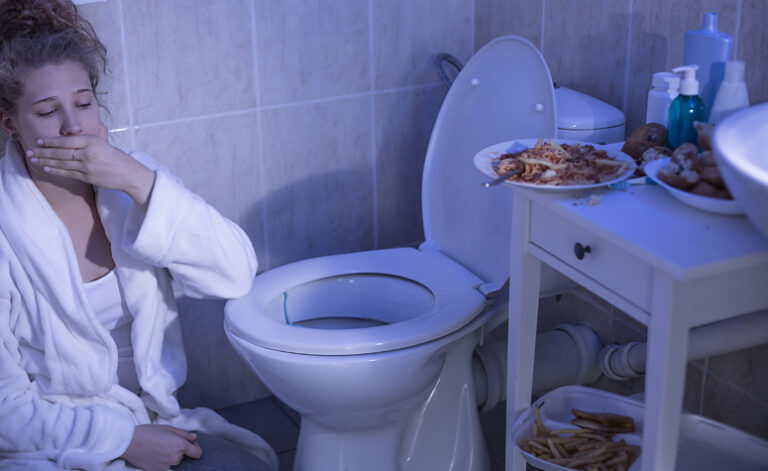Bulimia Treatment
Bulimia is a complex eating disorder, and many people in the UK suffer from this condition. It is often characterised by a series of binge eating episodes, followed by purging behaviours.
Binge eating is when someone eats large amounts of food within a short time, and often done in secret. Most of the time, while binge eating, you begin to feel like you have lost control and get into an eating frenzy until you start to feel sick because of the amount of food you consumed. After bingeing, purging behaviours come next. You try to force yourself to vomit, exercise aggressively and start abusing laxatives in an attempt to remove or compensate for the calories you consumed during your binge.
Bulimia is an eating disorder that is quite prevalent in the UK. According to estimates, one in 50 people will suffer from it at some point in their lives. Bulimia is more common among females than males, with the condition often developing during adolescence or young adulthood. Nevertheless, it’s important to understand that bulimia can affect anyone, regardless of gender and age.
These statistics on bulimia make us aware of the pervasive effect of the eating disorder on people and their loved ones. In this article, we will look into the different kinds of bulimia treatments available in the UK. Some of these include evidence-based therapies such as cognitive behavioural therapy (CBT) and the significant role of support groups in eating disorder recovery.

Symptoms of Bulimia
The pattern of bingeing and purging is the most common symptom of bulimia, but there are other signs to look out for.
Binge-purge cycles
Someone who has bulimia will often try to keep their bingeing and purging a secret and will take extreme measures to do this. Bingeing and purging can be defined as:
- Binge eating
When you consume a large amount of food even if you’re not feeling hungry. During a bingeing episode, you often eat three or four times more than you normally would. People tend to binge on ‘ junk food” such as crisps, chocolates, and other unhealthy foods. After bingeing, you start experiencing feelings of guilt, shame and distress. - Purging
This is when you try to get rid of the calories you consumed during your binge eating episode to keep them from turning into extra pounds and destroying your body shape. Purging is done by inducing vomiting, over-exercising, or abusing laxatives, enemas, and diuretics. A bulimic binge-purge cycle can be triggered by stress, anxiety, tiredness, and loneliness. Sometimes, people do it out of hunger or for no specific reason at all, merely a habit.
What is concerning is that people with bulimia physically appear to have a stable or “normal” weight because the binge-purge cycle keeps the weight off. You may have slight fluctuations in weight, but these are not as bad as in other eating disorders like anorexia or binge eating disorder (BED). Thus, people with bulimia may look to look healthy in terms of how much they weigh, making the eating disorder very challenging to identify.

Psychological and behavioural symptoms of bulimia
Someone who has bulimia will often try to keep their bingeing and purging a secret and will take extreme measures to do this. Bingeing and purging can be defined as:
- Dental problems
Repeated vomiting erodes results in dental problems such as tooth decay, gum problems, and the erosion of enamel on the teeth - Gastrointestinal issues
Self-induced vomiting may lead to gastrointestinal problems, such as acid reflux, stomach ulcers and irritation of the oesophagus - Dehydration
Frequent purging through vomiting or using laxatives can lead to dehydration, which can have serious health consequences - Electrolyte imbalance
Purging behaviours can also upset your body’s electrolyte balance which may result in irregular heartbeat and other serious complications - Fatigue
The physical strain and nutritional deficiencies can lead to extreme fatigue and substantial weakness - Swollen salivary glands
Frequent vomiting can lead to swollen salivary glands causing discomfort and puffiness in your cheeks - Skin and hair problems
Because the body becomes nutritionally deficient, your skin may become dry and with a yellowish tint; and your hair and nails may become brittle
The symptoms of bulimia can have adverse physical and psychological effects on your well-being and quality of life. This is why you should seek help from a professional who will work with you to overcome the challenges and move towards healing.


Fast Access to Residential Treatment
We are currently able to offer fast access to private inpatient treatment.
Please call us today and speak to one of our expert advisors.
Call in confidence: 0800 0148 970
Bulimia Treatment Options
Bulimia nervosa is a complex condition that requires treatment approaches which are tailor-made to every individual’s needs and circumstances. In the UK, there are several eating disorder treatment options available and determining the best one for you will depend on the severity of your case.
Outpatient and inpatient treatment for bulimia
There are two main ways through which bulimia treatment is provided, namely, outpatient and inpatient services. If you don’t require 24-hour monitoring for your eating disorder, the outpatient service may be appropriate for you. It will allow you to receive care while living at home and maintaining your daily routines.
Inpatient treatment, on the other hand, is for people who need round-the-clock care in managing their eating disorder. This involves being admitted to one of our clinics or eating disorder specialist treatment centres to receive more intensive care.
Therapy types for bulimia
Eating disorder treatment may also be through therapy such as:
- Cognitive behavioural therapy for bulimia nervosa (CBT-BN)
CBT-BN is a very effective type of therapy for bulimia. It is designed to assist you in addressing your distorted behaviours, food-related thoughts and feelings, body image and self-worth. CBT-BN will also guide you in developing healthier coping strategies that will help break the binge-purge cycle.
- Interpersonal therapy (IPT)
IPT focuses on addressing the interpersonal and emotional aspects of bulimia. The goal of IPT is to help you improve your relationships, communication skills and emotional regulation, all of which can help you lessen your binge-purge behaviours
- Family-based treatment (FBT)
For young people, family-based treatment (FBT) has proved to be a highly effective form of treatment for bulimia. FBT involves family members in the therapy process, which aims to help a young individual with anorexia achieve a healthy weight and eating pattern.
Evidence-based self-help for bulimia
There are tools and strategies called evidence-based self-help therapies that enable individuals to participate actively in their recovery. These resources, provided by many eating disorder treatment programmes, are used outside of therapy sessions.
You will receive these materials from wherever you’re getting your treatment for your eating disorder. Among these resources are educational materials, workbooks and guidance on self-help techniques and they are all based on evidence-based therapies.
Professional guidance given at the treatment centre and the resources for evidence-based self-help combined can provide you with solid support in your fight to overcome bulimia. This two-pronged approach arms you with the tools you need to continuously work on your recovery even after completing therapy and treatment.
Support groups for bulimia
Support groups play an invaluable role in the treatment of bulimia. With these groups, you have a safe and empathetic space with others undergoing a similar struggle. During support group meetings, you can share your experiences, challenges, and successes and connect with others who not only understand the recovery process but also offer you the emotional support and motivation that are very important in your healing.
Support groups are available to a broad group of people and may be accessed online and in-person. Beat, an eating disorder charity, runs several eating disorder support groups, including Dove, Kingfisher, and The Nest.
FREE Bulimia Assessment
If you or a loved one are struggling with bulimia, there is hope and healing for you. You can receive treatment as an outpatient or inpatient and through one-on-one or support group therapy. We understand the challenges you’re facing and we’re here to offer compassionate help and support.
We design personalised treatment plans that meet an individual’s unique needs and circumstances. We will work together to address your symptoms, help you develop coping strategies for the future and get you back on course.
We also have a young people’s service which provides specialist bulimia treatment exclusively for adolescents and young people.
Our highly trained advisers are available to speak to you right away, simply call 0808 252 3379 today.
We can discuss your concerns in complete confidence, explore the options for treatment, and help you to understand what will work best for you.
We’ll also help you to book your free bulimia assessment there and then, with appointments usually available within only a few days.
We understand that taking the first step can be the most difficult, but we’re here to support – with no pressure or judgement.
Professional and compassionate help is just a phone call or click away.

What lies behind us and what lies before us are
tiny matters compared to what lies within us
What Causes Bulimia?
Research shows that genetics, gender, personality, general mental health and social and environmental influences are the factors that may cause an individual to develop bulimia.
Genetics
If you have a family member who suffers from an eating disorder, you are more likely to develop one yourself compared to others because of your genetic predisposition to the condition. Furthermore, you may have acquired your family’s healthy attitude towards food and wrong eating habits, thinking they were normal, having been exposed to them from a young age.
Gender and age
According to research, women and girls between the ages of 15 and 25 are more likely to develop bulimia than men and boys. However, it’s crucial to understand that eating disorders can affect anyone and are becoming more and more common in males. Based on estimates, there are around 1.6 million people with an eating disorder in the UK, and approximately 25% of these are male.
Personality
People who possess certain personality traits may be more likely to develop bulimia. You have a higher tendency to develop eating behaviours if you:
- Are a “perfectionist”
- Have low self-esteem
- Have a fear of failure
- Are a people pleaser
Psychological mental health
Having existing mental issues makes you more vulnerable to developing bulimia. These underlying mental conditions may include:
- Obsessive-compulsive disorder (OCD)
- Body dysmorphic disorder (BDD)
- Depression
- Anxiety
- Depression
Society
Today’s society presents us with all kinds of social pressures which can cause people to develop unhealthy relationships with food. Media has always heavily endorsed the idea of thinness as beautiful (publishing airbrushed pictures of celebrities and promoting pro-bulimia ”Mia” websites) and celebrating jobs where being skinny is the ideal (such as dancing, modelling, or athletics).
Environment
Many environmental factors may also influence an individual into developing bulimia. Some of the most common factors include the following:
- Being criticised for your weight or eating habits
- Being the victim of physical, sexual or emotional abuse
- Going through a stressful life event such as bereavement or losing your job
- Loneliness
- Experiencing pressures at work or school
Support for families and loved ones
We know that it can be incredibly hard for families and loved ones to witness someone they care about suffer through an eating disorder. This is the reason why we have specialist family support available to the families, carers, and loved ones of our eating disorder patients. Our family support sessions are normally scheduled weekly and can be delivered online or face-to-face. The sessions aim to educate family members about eating disorders and cover relevant topics such as the following:

- Understanding eating disorders
- Specialist skills when living with someone with an eating disorder
- Cognitive behavioural therapy (CBT) for eating disorders, known as CBT-enhanced (CBT-E) – an understanding of this therapy model and how to apply it from a carer’s perspective
- Managing difficult conversations
- The impact of the eating disorder on the individual/family, helping you to process your own experiences of your loved one’s eating disorder
- When to stand back




